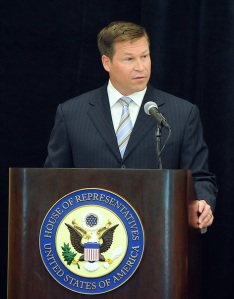Four new polls were released on Friday and each showed developing races that are becoming close. In yet another study that depicts Rep. Connie Mack IV
(R-FL-14) performing very well against two-term Sen. Bill Nelson (D), Survey USA produces numbers reflecting a hot Florida Senate race. According to S-USA (July 17-19; 647 likely Florida voters), Mack actually leads the incumbent Democrat 48-42 percent. The same sample gives President Obama a 48-43 percent lead over Mitt Romney, telling us there is no Republican skew in the respondent sample.
Since May 1, eight public polls of this Florida race have been released from six different pollsters (Quinnipiac University conducted three of the surveys as part of their monthly polling program). In five of the eight Nelson leads. In the other three, challenger Mack has the advantage. The swing goes all the way from 49-36 percent in the senator’s favor (Public Policy Polling; May 31-June 3) to Mack leading 46-37 percent (Rasmussen Reports, July 9). This provides us a net curve of 22 points. Such a large polling variance often reveals an extremely volatile campaign with an electorate willing to change course on a dime. There has been enough polling to tell us that the Florida Senate race features true competition and the thought that Sen. Nelson would have a relatively easy ride to re-election has now been firmly dispelled.
Staying in the Senate, Rasmussen Reports (July 18; 500 likely Ohio voters) projects that the Ohio race is continuing upon a competitive path. The latest RR data gives first-term Sen. Sherrod Brown (D) a 46-42 percent lead over GOP state Treasurer Josh Mandel. The senator has maintained at least a small lead for most of the previous 12-month period. In the presidential race, this Rasmussen sample returned a 47-46 percent spread in the president’s favor.
Other polls have shown much stronger leads for Sen. Brown. Seven surveys have been taken of the Ohio Senate race since the beginning of May, from four different pollsters. All show Brown ahead. His advantage ranges from the four-point lead in the current Rasmussen poll all the way to sixteen (50-34 percent; Quinnipiac University, June 19-25).
Polling also indicates that two southern California congressional campaigns are very close. In the new 24th Congressional District, in what appears to be a pure 50/50 toss-up seat for incumbent Rep. Lois Capps (D), Public Opinion Strategies, polling for Republican Abel Maldonado’s campaign (June 26-28; 400 registered CA-24 voters just now released), projects a two-point race with the incumbent leading 48-46 percent. In the jungle primary, Capps received 46.4 percent, Maldonado obtained 29.7 percent, and Republican Chris Mitchum, son of late actor Robert Mitchum, garnered 21.5 percent. With the combined Republican primary vote exceeding a majority of the ballots cast (51.2 percent), the general election battle is clearly becoming a toss-up.
To the southeast in Long Beach, another survey indicates a close race developing in a newly created open seat, numbered District 47. Here, Democratic state Sen. Alan Lowenthal and Republican Long Beach City Councilman Gary DeLong qualified for the general election with the former scoring 33.8 percent to the latter’s 29.4 percent in a field of eight candidates.
Though this district sets up well for the Democrats, a Probolsky Research survey for the DeLong campaign (June 28-July 3, 400 registered CA-47 voters – released just now) gives Lowenthal only a 44-41 percent advantage as the general election campaign begins in earnest.
This race merits attention and should be considered a lower-level upset opportunity for Republicans. Lowenthal has been underwhelming on the fundraising front, raising just over $511,000, which pales in comparison to DeLong’s $862,908. Gov. Jerry Brown carried this seat 50-41 percent; Sen. Barbara Boxer won it 49-41 percent; and Democratic Attorney General Kamala Harris lost the district 39-45 percent. The Democrats’ voter registration advantage is a little over 10 percent more than Republicans. This campaign carries a Lean Democratic rating with movement toward the toss-up column.


